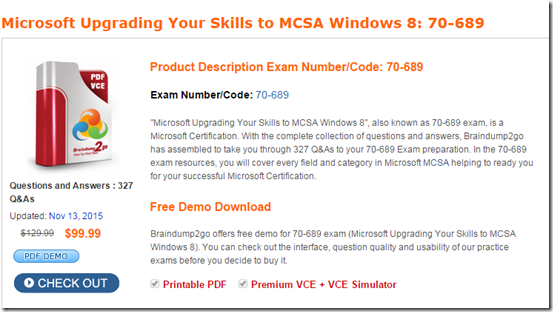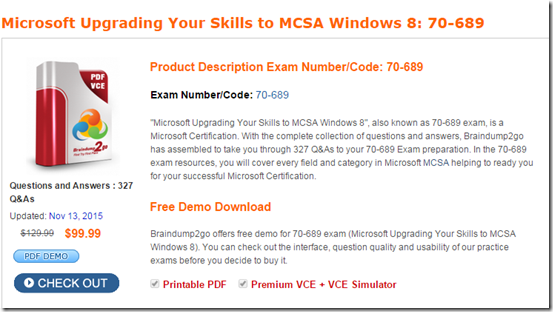MICROSOFT NEWS: 70-689 Exam Questions has been Updated Today! Get Latest 70-689 VCE and 70-689 PDF Instantly! Welcome to Download the Newest Braindump2go 70-689 VCE&70-689 PDF Dumps: http://www.braindump2go.com/70-689.html (327 Q&As)
We never believe in second chances and Braindump2go brings you the best 70-689 Exam Preparation Materials which will make you pass in the first attempt.We guarantee all questions and answers in our 70-689 Dumps are the latest released,we check all exam dumps questions from time to time according to Microsoft Official Center, in order to guarantee you can read the latest questions!
Exam Code: 70-689
Exam Name: Upgrading Your Skills to MCSA Windows 8
Certification Provider: Microsoft
Corresponding Certifications: MCSA, MCSA: Windows 8
70-689 Dumps,70-689 PDF,70-689 VCE,70-689 Study Guide,70-689 Study Material,70-689 eBook,70-689 Book,70-689 Exam Questions,70-689 Exam Dump,70-689 Exam Book,70-689 Braindump,70-689 Practice Test,70-689 Practice Exam,70-689 Practice Questions,70-689 Prep,70-689 Upgrading Your Skills to MCSA Windows 8

QUESTION 301
You have 100 Windows 8.1 Pro client computers that run.
Each computer has a single local hard disk drive, a DVD drive. and an external USB drive.
Each computer has a different set of line-of-business (LOB) desktop applications that are installed locally. All of the applications store their configurations in the HKEY_Local_Machine\Software registry hive.
You need to design a recovery solution to ensure that you can restore the initial state of the locally installed LOB desktop applications if an application is misconfigured. The solution must preserve the existing locally stored user data.
What should you do?
A. Run redmg-exe. Perform a system reset
B. Create a restore point Perform a system restore.
C. Enable File History. Restore files by using File History.
D. Create a recovery drive. Start the computer from the recovery drive and perform a refresh.
Answer: C
QUESTION 302
You are a desktop support technician for your company.
A user reports that her Windows 8.1 computer is missing .dll files.
You need to restore the missing *dll files without losing the user’s data.
What should you do?
A. Use System Restore.
B. Refresh the computer.
C. Open PowerShell and run the wbadmin cmdlet.
D. Run the redmg command.
Answer: A
QUESTION 313
You administer Windows 8.1 Pro dient computers that are members of an Active Directory domain that includes Active Directory Certificate Services (AD CS).
You restored a computer from a backup that was taken 45 days ago.
Users are no longer able to log on to that computer by using their domain accounts.
An error message states that the trust relationship between the computer and the primary domain has failed.
You need to restore the ability to log on to domain accounts, with a minimal risk of data loss.
What should you do?
A. Logon as a local administrator and issue the netdom resetpwd command.
Log off and restart the computer.
B. Reset the passwords of all affected domain users.
C. Restore the client computer from a known good backup that was taken two weeks earlier than the backup you previously restored.
D. Renew the certificates issued to the dient computer.
Answer: A
QUESTION 314
You administer Windows 8.1 Pro desktops.
You discover that a company employee enabled file encryption on several folders by using a self- signed Encrypted File System (EFS) certificate.
You need to ensure that you are able to decrypt the encrypted files if the user profile is deleted.
What should you do?
A. Open the Certificates console and connect to the user account certificates.
Find the personal self-signed EFS certificate and export it to a Personal Information Exchange (PFX) file.
B. Open the Certificates console and connect to the computer account certificates.
Export the self-signed EFS certificate from the Trusted People folder to a Canonical Encoding Rules (CER) file.
C. Open the Certificates console and connect to the user account certificates.
Export the personal seff-signed EFS certificate from the Trusted Root Certification Authority folder to a Personal Information Exchange (PFX) file.
D. Open the Certificates console and connect to the user account certificates.
Export the self-signed EFS certificate from the Trusted People folder to a Canonical Encoding Rules (CER) file.
Answer: B
QUESTION 326
You are an application developer for a federal government agency.
You maintain a legacy application that the agency originally developed for Windows 2000.
The agency is upgrading all desktop computers to Windows 8.1.
The legacy application does not run on Windows 8.1.
You use the Application Compatibility Toolkit (ACT) to create a shim.
You need to deploy the shim to all Windows 8.1 computers.
What should you do?
A. Install the shim on all Windows XP computers prior to the Windows ai upgrade.
B. Run the sdbinst.exe utility on each computer to install the shim locally.
C. Install .NET Framework 4 with current software updates.
D. Configure a Group Policy to install the shim with user privileges.
Answer: D
2015 Latest Released Microsoft 70-689 Exam Dumps Free Download From Braindump2go Now! All Questions and Answers are chcked again by Braindump2go Experts Team, 100% Real Questions and Correct Answers Guaranteed! Full Money Back Guarantee Show our Confidence in helping you have a 100% Success of Exam 70-689! Just have a try!

FREE DOWNLOAD: NEW UPDATED 70-689 PDF Dumps & 70-689 VCE Dumps from Braindump2go: http://www.braindump2go.com/70-689.html (327 Q&A)